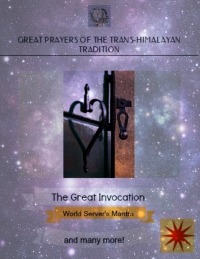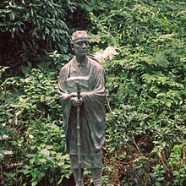
Does It Matter If It’s a Summer Day
There is a wonderful Zen poem that goes this way:
Who made the world?
Who made the swan, and the black bear?
Who made the grasshopper?
This grasshopper, I mean—
the one who has flung herself out on the grass,
the one who is eating sugar out of my hand,
who is moving her jaws back and forth instead of up and down—
who is gazing around with her enormous and complicated eyes.
Now she lifts her pale forearms and thoroughly washes her face.
Now she snaps her wings open, and floats away.
I don’t know exactly what a prayer is.
I do know how to pay attention, how to fall down into the grass,
How to be idle and blessed, how to stroll through the fields,
which is what I have been doing all day.
Tell me, what else should I have been doing all day.
Doesn’t everything die at last, and too soon.
Tell me, what it is you plan to do
with your one wild and precious life?—Basho
How perfect the poem is! Every drop of the poet’s craft oozes out of the ink on the page.
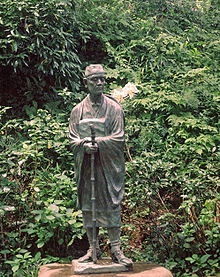 It reveals what happened when Basho went to visit his friend and Zen master, Bucho Zenji, on a clear day in May long ago.
It reveals what happened when Basho went to visit his friend and Zen master, Bucho Zenji, on a clear day in May long ago.
The two old friends greeted each other and Bucho was delighted about their meeting. He said to Basho, “Well, what have you realized? What did you see?” The Zen Master picked up the subtle
hint of change in Basho. “What have you gone through? What is it?” Bucho asked.
Basho answered, “The rain has finished and the mountains are greener than ever.”
Bucho refused to accept just that. He wanted to know about the Buddhadharma. He asked, “What is the Buddhadharma prior to the green mountains?
What is the state of mind before any sense perception of the green mountains.
Bucho was really asking about Basho’s pure transparent source of awareness. He was trying to get to that unsullied place in Basho before there was dualistic thinking, to that time when everything was whole and perfect.
Bucho was trying to find out the source of the universe. What is the real substance of awareness? How did you perceive it?
Basho shot the words right back, “Jumping into the river, the sound of water.”
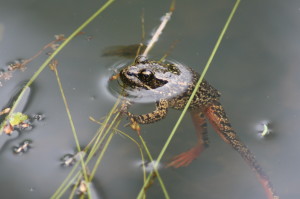 With these words Basho explained what the Buddhadharma was before something—probably a frog—jumped into the water. That was the place before preconceived and dualistic thinking.
With these words Basho explained what the Buddhadharma was before something—probably a frog—jumped into the water. That was the place before preconceived and dualistic thinking.
So what is this moment’s pure awareness?
Basho could almost feel Bucho’s delight. “Yes, that’s it! That’s it!” Bucho wanted to be sure Basho hadn’t fallen into the trap of nihilism and that Basho was coming from a place within himself of unsullied wonder.
“Our Mind is, as it is, the whole universe. The whole universe, as it is, is our Mind.”
“Into the old pond, the frog jumps in.”
–Basho
In his delight Bucho, the Zen master, then passed the Dharma to Basho who wrote the poems.
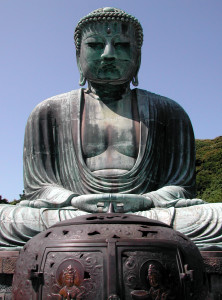
* * *
Ideas and inspiration from A Staff for the Mind, by Kokoro no Tsue, a handmade book of Calligraphy and the Teachings of Shodo Harada Roshi, Tahoma Sogenji, One Drop Monastery, Freeland Washington, 2010
Rebecca Field
© All Rights Reserved Worldwide






